|
|
|
Sort Order |
|
|
|
Items / Page
|
|
|
|
|
|
|
| Srl | Item |
| 1 |
ID:
113795
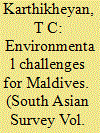

|
|
|
|
|
| Publication |
2010.
|
| Summary/Abstract |
This article looks into the environmental challenges that Maldives, an island country in the South Asian region, is facing. It studies all possible sources of environmental challenges with inherent vulnerabilities of the country in terms of its geographic and environmental conditions, and analyses important contributing factors such as global warming, sea level rise, tourism and environmental degradation and, more importantly, the 2004 tsunami. The article particularly examines the effects of global warming on Maldives on the basis of the Intergovernmental Panel on Climate Change's (IPCC) report on climate change. The impact of the tsunami and its repercussions on the Maldives's ecological fragility are also discussed. Towards the conclusion, this article focuses on the need of the Maldivian government to formulate appropriate policies and also, at the same time, the difficulties in realising those policies.
|
|
|
|
|
|
|
|
|
|
|
|
|
|
|
|
| 2 |
ID:
113788
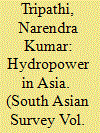

|
|
|
|
|
| Publication |
2010.
|
| Summary/Abstract |
The article seeks to put forward a dynamic conception of construction of issues and their resolution, largely falling under the theoretical rubric of constructivism. The hydropower issues on the Asian continent pertaining to transboundary rivers construct a dynamic binary of dependence and interdependence. Instead of being permanently resolved, as suggested by epistemic community proponents, the issues follow a Hegelian dialectical ontology of problem to solution leading to a new problem. The organisation of the article, built around two foci, India and China, is elliptical. Both countries share transboundary rivers with a number of countries. Most bilateral agreements are, when signed, hailed as the dawn of a new era, before themselves becoming contentious, spawning a new cycle of accusations and counter-accusations. River water issues generate a complex binary of dependence and interdependence, played along the intersection of domestic and international.
|
|
|
|
|
|
|
|
|
|
|
|
|
|
|
|
| 3 |
ID:
113792
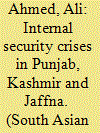

|
|
|
|
|
| Publication |
2010.
|
| Summary/Abstract |
The article argues that the militarised nature of India's initial reaction to an internal security crisis contributes to deterioration in the situation. The resulting full-blown insurgency, usually complicated by proxy war, takes several years to wind down due to the political prong of strategy not keeping pace with the military prong. This is to the detriment of the legitimacy of the state and exacts a high human price. Learning lessons from India's initial reaction to insurgency outbreak therefore helps to highlight the importance of prevention and possibilities in non-militarised alternatives. The article considers the initial phases of three of India's major counter-insurgency engagements-Punjab, Kashmir and in Tamil areas of Sri Lanka-to arrive at the conclusion that moderation in facing crisis prevents conflict outbreak.
|
|
|
|
|
|
|
|
|
|
|
|
|
|
|
|
| 4 |
ID:
113793


|
|
|
|
|
| Publication |
2012.
|
| Summary/Abstract |
Foreign policies are designed to help protect a country's national interest-its national security, ideological goals and economic prosperity. Owing to the anarchic nature of the international political system, states feel a high degree of insecurity: lacking systemic guarantees of state security, war remains a legitimate instrument of foreign policy. Self-protection is the sole protection in an essentially anarchical system. While the primary objective of this article is to examine Pakistan's foreign policy, it also evaluates two approaches to international relations, idealism and realism. Lastly, the article analyses the security perception of Pakistan and the role of the military in foreign policy making. The theoretical foundation of this study is realism, because Pakistan foreign policy is a classic example of political realism.
|
|
|
|
|
|
|
|
|
|
|
|
|
|
|
|
| 5 |
ID:
113787


|
|
|
|
|
| Publication |
2010.
|
| Summary/Abstract |
Analysis of rising powers needs to be conducted not just in terms of their overall capabilities but also of their geopolitical circumstances-where they are placed in respect of domestic polity, their neighbourhoods, their regions and the globe. As a rising power, India is particularly closely embedded in its South Asian neighbourhood by tightly enmeshed domestic and neighbourhood dissonances. These are in turn deeply affected by global conditions, especially the rise of China and globalisation of a militant version of Islam. This article analyses India's 'strategies' in dealing with its circumstances and concludes that, at least for the present, India has delayed the process of ardent military modernisation in favour of balanced development in an attempt to achieve greater domestic harmony and reduce vulnerability to destabilising cross-border influences. Strategies in South Asia are, however, less well developed and require greater attention.
|
|
|
|
|
|
|
|
|
|
|
|
|
|
|
|
| 6 |
ID:
113790


|
|
|
|
|
| Publication |
2010.
|
| Summary/Abstract |
After the 1998 tests, both India and Pakistan possess nuclear weapons, weapon usable material and significant civilian and military nuclear infrastructure. Both are seriously engaged in revising their plans and refining their weapons and delivery systems. They are spending enormous sums on the production, deployment, targeting, defence, supervision and control of their nuclear weapons and delivery systems, as well as on the infrastructure that would generate the fissile material, warheads, aircraft, missiles and command and control systems necessary for their nuclear programmes. But they observe utmost secrecy in all these matters. Hence, it is very difficult to comparatively assess their nuclear programmes. Much of the available literature is speculative and unreliable, and requires careful examination. The article compares the two nuclear programmes in terms of their respective nuclearisation routes, motivations, weapons capabilities, inventories, nuclear doctrines, command and control and delivery systems.
|
|
|
|
|
|
|
|
|
|
|
|
|
|
|
|
| 7 |
ID:
113791
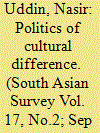

|
|
|
|
|
| Publication |
2010.
|
| Summary/Abstract |
This article analyses the formation of an ethnic category and its relations with the marginalisation of ethnic minorities in the context of upland-lowland relations in Bangladesh. Three central concerns are highlighted. First, it examines the political and historical trajectories of the South Asian subcontinent which has laid down various identities for groups of people such as the Pahari living in the Chittagong Hill Tracts (CHT) of Bangladesh. Second, it critically discusses how colonial policy has continued in the postcolonial era, particularly in dealing with people of different cultures living in the same state's territory. Finally, the article argues that identity formation is closely linked with the politics of marginality, with particular reference to the Pahari people of the CHT. The article is based on comprehensive data collected through ethnographic fieldwork undertaken at different times from 1997 onwards.
|
|
|
|
|
|
|
|
|
|
|
|
|
|
|
|
| 8 |
ID:
113789


|
|
|
|
|
| Publication |
2010.
|
| Summary/Abstract |
Asia's emergence as the world's fastest-growing region, with rising military expenditures and a substantial restructuring of power, has given rise to new strategic alliances and coalitions between the region's major players. The quadrilateral initiative, a grouping of the United States (US), Japan, Australia and India, emerged after tsunami cooperation in 2004 between these four countries and was later advocated by the Japanese Premier. Strategically designed to balance power and tackle issues like transnational security, terrorism and sea piracy in the Asia-Pacific region, the Quad was put on the backburner following Beijing's protests that it had been specifically designed to encircle it. Nevertheless, India's strategic ties with the US, Australia and Japan are growing and the US links with Japan and Australia have been strengthened in the Trilateral Security Dialogue. The article examines the factors that justify the existence of the Quad and asserts that the possibility of strategic partnership among these four maritime democracies remains alive.
|
|
|
|
|
|
|
|
|
|
|
|
|
|
|
|
| 9 |
ID:
113794
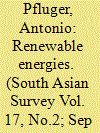

|
|
|
|
|
| Publication |
2010.
|
| Summary/Abstract |
Energy efficiency and energy conservation are the cornerstones of win-win strategies for reducing emissions while fostering economic development. Renewable energies can technically contribute to practically all sectors of energy demand, that is, fuel for transportation, electricity, low temperature heat for space heating and hot water and, to a limited degree, to high temperature process heat. However, costs and variability are the two major security concerns regarding renewable energies. An improvement of energy security by using renewable energies is possible but it causes additional costs. However, a sufficiently widespread variety of energy sources implies the acceptance of a certain spread of costs in any case. This means that efforts to improve energy security do not come for free. More secure energy systems require higher costs and thus, higher energy prices.
|
|
|
|
|
|
|
|
|
|
|
|
|
|
|
|
|
|
|
|
|